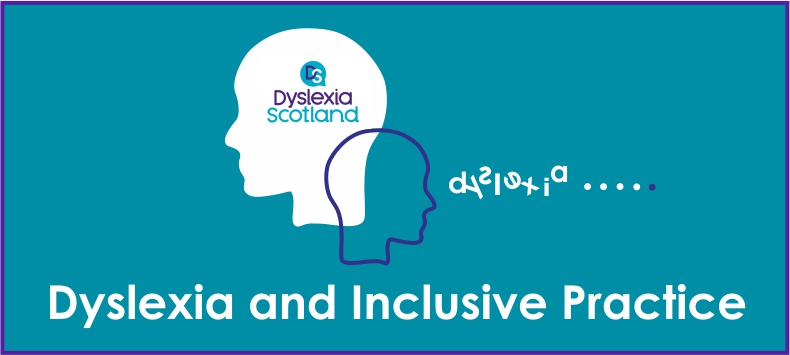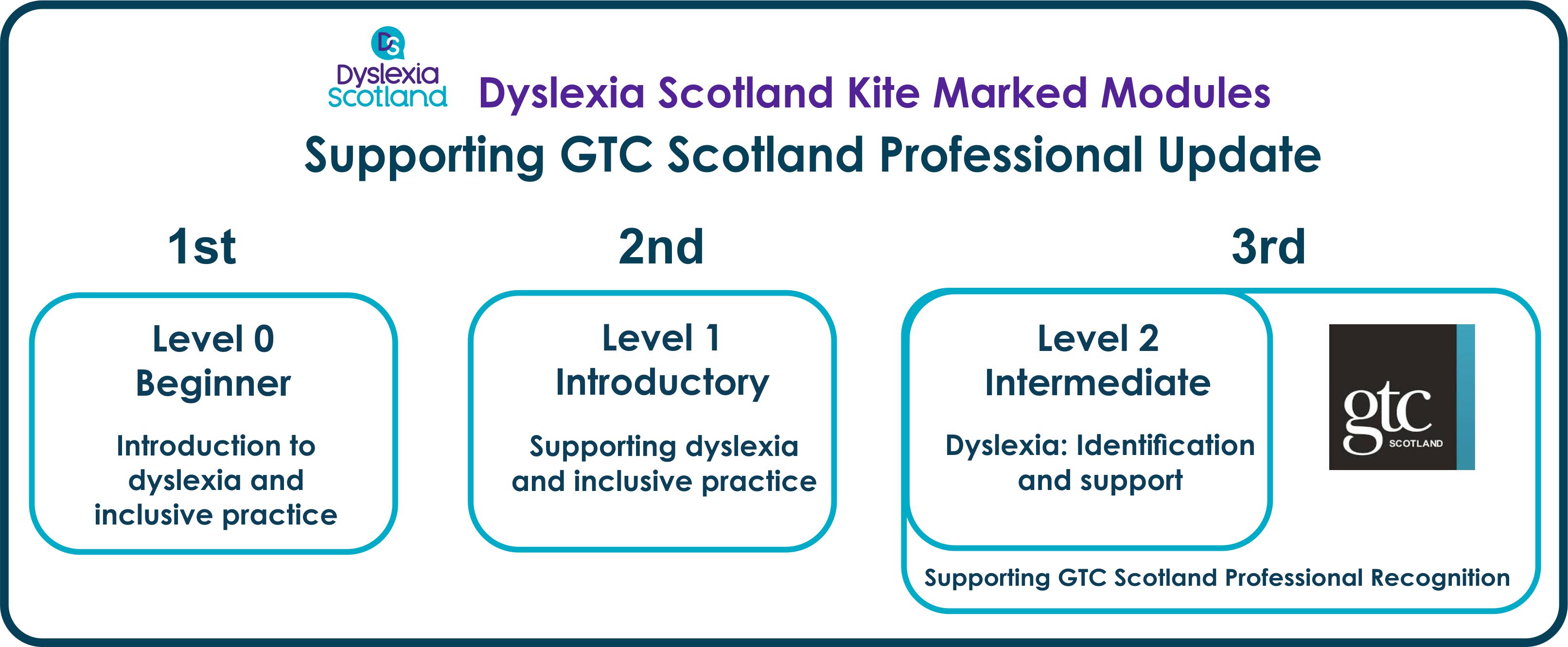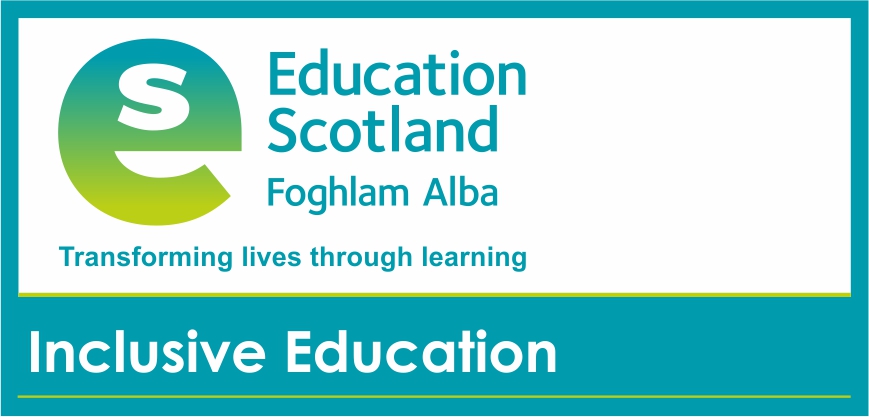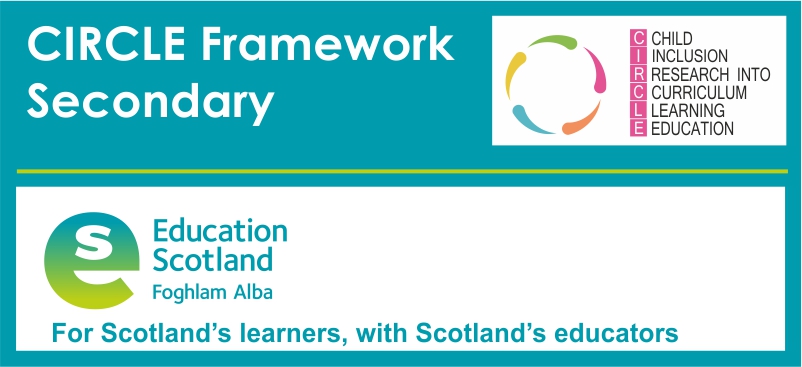Free Online Learning Modules

Free Open University Online Learning Modules
Three free online learning modules, which support GTC Scotland Professional Standards, Professional Update and Professional Recognition, have been developed in response to Recommendations 1 and 2 of the 2014 Education Scotland Review: Making Sense of Dyslexia: Education for Children and Young People with Dyslexia in Scotland. The modules are primarily for teachers, school management and GTCS registered local authority education officers. The modules are:
- Module 1: ‘Introduction to Dyslexia and Inclusive Practice’
- Module 2: 'Supporting Dyslexia, Inclusive Practice and Literacy'
- Module 3: 'Dyslexia: Identification and Support'
All of the modules need to be completed in order - you cannot go straight to module 2 or 3 without doing the previous one. Please note that you need to log into OpenLearn Create before you start the modules. These modules were refreshed in April 2021 to reflect feedback from teachers who have completed the modules from 2018 - 2021. They now incorporate GTCS's 2021 Professional Standards.
Click here to access Module 1 'Introduction to Dyslexia and Inclusive Practice'
Click here to access Module 2 'Supporting Dyslexia, Inclusive Practice and Literacy'
Click here to access Module 3 'Dyslexia: Identification and Support'
The modules have been developed to complement the 2015 Education Scotland Route Map for Dyslexia and Inclusive Practice. They were written by the Making Sense Working Group and supported by the Opening Educational Practices Scotland Project hosted at the Open University in Scotland.
The modules are hosted on the Open University OpenLearn Create platform. Mozilla Open Badges will be available for those completing the modules.
Dyslexia and inclusive practice GTCS Professional Recognition programme
We are delighted that Dyslexia Scotland was awarded unconditional accreditation to deliver a GTCS Professional Recognition programme in ‘Dyslexia and Inclusive Practice’. Accreditation is for five years from May 2021.
The programme will develop accomplished expert teachers in dyslexia and inclusive practice, who will be well equipped to support learners and colleagues through the holistic identification and support process for dyslexia in Scotland. The programme will be delivered in close collaboration with Education Scotland and the Addressing Dyslexia Toolkit working group.
The first programme started in September 2021 and will last an academic year. There will be another opportunity for teachers to apply next year.

This short course is designed to provide an introduction for teachers, community educators and anyone with an interest in developing positive approaches to supporting dyslexia in their inclusive practice. This resource links to the General Council for Scotland’s Professional Standards.
This module will support a deeper understanding of dyslexia and inclusion. Module 2 has been designed to provide practitioners with a deeper understanding of:
- Dyslexia and inclusive practice within the Scottish context of education, equality and equity
- Dyslexia and how it is identified
- Dyslexia, co-occurring additional support needs and inclusive practice
- Effective communication
- Support strategies
This module is for specialist support teachers.
Module 3 has been designed to provide practitioners with a deeper understanding and experience of:
- Holistic and collaborative identification of dyslexia using the Pathway within the Addressing Dyslexia Toolkit.
- Appropriate support and assessment within the Scottish context
- Enabling school communities to improve the outcomes of learners with dyslexia and associated difficulties
- Supporting school communities to improve inclusive practice
- Developing learner profiles to support post school transition
Professional Recognition Practitioner Enquiry Topics
Ten practitioners were awarded the Dyslexia and inclusive practice Professional Recognition Awards in January 2020 following the two-year pilot programme delivered in collaboration with Dyslexia Scotland, Education Scotland, the Scottish Government and GTCS.
These are the topics that the successful awardees researched as part of their practitioner enquiry:
- Understanding Dyslexia, with a focus on the identification process
- Reducing potential barriers to learning, providing appropriate resources and strategies to ensure dyslexic pupils feel included so that their achievement and attainment success follows.
- Exploring the use of Peer Support at transition to Secondary School to improve the Health and Wellbeing of dyslexic learners
- The holistic assessment and identification of Dyslexia: A new process of least intrusive, holistic assessment using a team around the child approach
- How young people with dyslexia can be more effectively encouraged to become confident digital learners.
- The introduction of a whole school visual approach to support the auditory processing needs of pupils.
- Leadership of improvement in dyslexia and inclusive practice. Adopting a whole school approach to improvement, through implementation of inclusive pedagogies and practices to enhance pupils learning and raise attainment.
- Supporting teacher learning in the field of identifying dyslexia within an inclusive practice model and the Dyslexia Identification Pathway (Addressing Dyslexia Toolkit) which offers a way to shape the existing process into a cohesive, holistic, and collaborative school-wide system
- Does training staff to understand the complexities of dyslexia help them to feel better equipped to help, to feel valued and to understand the pupil better? Does training the support staff also help to target support more specifically and ultimately benefit the pupil(s) in the classroom environment by providing an inclusive ethos?
- Helping learners with dyslexia build confidence and strategies to progress in the world with digital supports.
Introduction to Dyslexia and Inclusive Practice Module - CLD, Post School
This introductory module aims to provide practitioners who work in a CLD setting (post school) with an improved awareness of what dyslexia is, its impact, how it is assessed in different contexts and how it can be supported within an inclusive learning environment.
It is anticipated that the module will take between 2 - 3 hours to complete, depending on prior knowledge and the depth of learning undertaken.
The module has been developed and written by a collaborative partnership between Education Scotland, Dyslexia Scotland and the CLD Standards Council Scotland with support from the Specific Learning Difficulties Forum.
www.open.edu/openlearncreate/dyslexia-inclusive-practice-CLD
Aims of all four modules:
- To inform practitioners about ways in which they might engage in meaningful career-long professional learning in order to improve outcomes for children, young people and adults
- Provide free and accessible opportunities to engage with professional learning
- To support deeper learning and understanding of dyslexia and inclusive practice
- Provide opportunities for participants to reflect on their practice regarding dyslexia and inclusion
- To encourage all teachers to be familiar with, and make appropriate use of, the Addressing Dyslexia Toolkit and to encourage those working with adults to be aware of the range of resources available
- To support teachers in achieving professional recognition for areas of enhanced accomplishment in their professional practice and to support those working with adults in their continuing professional development
Education Scotland has a suite of free online learning modules which support GTC Scotland Professional Standards, Professional Update and Professional Recognition. These have been developed to support inclusive education. The modules are primarily for teachers, school management and GTCS registered local authority education officers.

This module provides educational practitioners and local authorities with an introduction to inclusion and equality set within the context of Scottish education. The module and activities will support practitioners to develop an:
- Understanding of the education context in Scotland of inclusion and equality
- Awareness of additional support needs and inclusion
- Awareness of how to deliver child centred approaches within the Scottish legislative framework
- Awareness of universal and targeted support
- Awareness of information and approaches which support inclusive education.
This module been also designed to support teachers meet the GTCS standards for Professional Learning, annual reviews and Professional Update.
Further information and a link to the module can be found on the National Improvement Hub page.
This module provides educational practitioners in secondary schools and local authorities. It is based on The CIRCLE Framework, a collaboration between practitioners in Edinburgh City Council, Queen Margaret University and NHS Lothian, that has been adapted for modular learning by Education Scotland.
It offers practical advice on how to meet the needs of individual learners and supports practitioners to develop collaborative approaches and share good practice.
After studying this module practitioners will have:
- An understanding of how to promote effective inclusive practice using the CIRCLE Framework of inclusion
- An awareness of how to promote a learner centred approach where learners are listened to and involved in the management of their own learning
- An awareness of documentation to evidence assessment and input.
Further information and a link to the module can be found on the National Improvement Hub page.

Introduction to Autism and Inclusive Education.
Inclusion in Practice: The CIRCLE Framework – Primary
Please see Learning Opportunities and Resources for further suggestions of professional development materials and resources.
